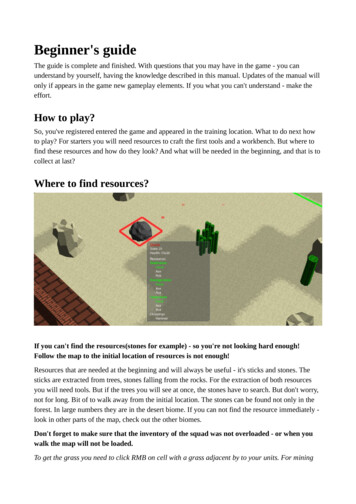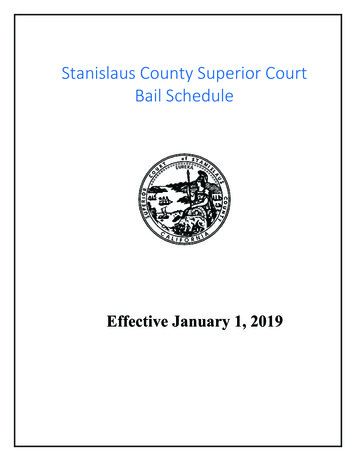
Transcription
MURDER IS EASYAgatha Christie
Chapter 1England! England after many years! How was he going to like it? LukeFitzwilliam asked himself that question as he walked down thegangplank to the dock. It was present at the back of his mind allthrough the wait in the customs shed. It came suddenly to the forewhen he was finally seated in the boat train. Here he was, honorablyretired on a pension, with some small private means of his own, agentleman of leisure, come home to England. What was he going to dowith himself? With an effort, Luke Fitzwilliam averted his eyes from thelandscape outside the railway-carriage window and settled down to aperusal of the papers he had just bought. The Times, the Daily Clarionand Punch.He started with the Daily Clarion. The Clarion was given over entirelyto Epsom.He had drawn a horse in the club sweep and he looked now to seewhat the Clarion's racing correspondent thought of its chances. Hefound it dismissed contemptuously in a sentence:Of the others, Jujube the II, Mark's Mile, Santony and Jerry Boy arehardly likely to qualify for a place. A likely outsider is -But Luke paid no attention to the likely outsider. His eye had shifted tothe betting. Jujube the II was listed at a modest 40 to 1. He glanced athis watch. A quarter to four.
"Well," he thought, "it's over now." And he wished he'd had a bet onClarigold, who was the second favorite.Then he opened the Times and became absorbed in more seriousmatters. A full half hour afterward the train slowed down and finallystopped. Luke looked out of the window.They were in a large empty-looking station with many platforms. Hecaught sight of a bookstall some way up the platform with a placardDERBY RESULT. Luke opened the door, jumped out, and ran towardthe bookstall. A moment later he was staring with a broad grin at a fewsmudged lines in the stop press.DERBY RESULT1st - Jujube the II2nd - Mazeppa3rd - ClarigoldLuke grinned broadly. A hundred pounds to blow! Good old Jujube theII, so scornfully dismissed by all the tipsters. He folded the paper, stillgrinning to himself, and turned back - to face emptiness. In theexcitement of Jujube the II's victory, his train had slipped out of the
station unnoticed by him. "When the devil did that train go out?" hedemanded of a gloomy-looking porter."What train? There hasn't been no train since the 3:14.""There was a train here just now. I got out of it. The boat express.""The boat express don't stop anywhere till London.""But it did," Luke assured him. "I got out of it."Faced by facts, the porter changed his ground. "You didn't ought tohave done," he said reproachfully. "It don't stop here.""But it did.""That was signal, that was. Signal against it. It didn't what you'd call'stop.' You didn't ought to have got out.""We'll admit that," said Luke. "The wrong is done, past all recall. WhatI'm trying to get at is, what do you, a man experienced in the servicesof the railway company, advise me to do?""Reckon," said the porter, "you'd best go on by the 4:25.""If the 4:25 goes to London," said Luke, "the 4:25 is the train for me."Reassured on that point, Luke strolled up and down the platform. Alarge board informed him that he was at FENNY CLAYTON JUNCTIONFOR WYCHWOOD UNDER ASHE, and presently a train consisting of
one carriage pushed backward by an antiquated little engine cameslowly puffing in and deposited itself in a modest way.At last, with immense importance, the London train came in. Lukescrutinized each compartment. The first, a smoker, contained agentleman of military aspects smoking a cigar. He passed on to thenext one, which contained a tired-looking, genteel young woman,possibly a nursery governess, and an active-looking small boy of aboutthree. Luke passed on quickly. The next door was open and thecarriage contained one passenger, an elderly lady. She reminded Lukeslightly of one of his aunts, his Aunt Mildred, who had courageouslyallowed him to keep a grass snake when he was ten years old. AuntMildred had been decidedly a good aunt as aunts go. Luke entered thecarriage and sat down.After some five minutes of intense activity on the part of milk vans,luggage trucks and other excitements, the train moved slowly out ofthe station. Luke unfolded his paper and turned to such items of newsas might interest a man who had already read his morning paper. Hedid not hope to read it for long. Being a man of many aunts, he wasfairly certain that the nice old lady in the corner did not propose totravel in silence to London. He was right - a window that neededadjusting, a dropped umbrella, and the old lady was telling him what agood train this was. "Only an hour and ten minutes. That's very good,you know, very good indeed. Much better than the morning one. Thattakes an hour and forty minutes." She went on: "Of course, nearlyeveryone goes by the morning one. I mean when it is the cheap way it'ssilly to go up in the afternoon. I meant to go up this morning but WonkyPooh was missing - that's my cat, a Persian; such a beauty, only he's
had a painful ear lately - and of course I couldn't leave home till he wasfound!"Luke murmured, "Of course not," and let his eyes drop ostentatiouslyto his paper. But it was of no avail. The flood went on:"So I just made the best of a bad job and took the afternoon traininstead, and, of course, it's a blessing in one way, because it's not socrowded - not that that matters when one is traveling first class. Ofcourse, I don't usually do that, but really I was so upset because, yousee, I'm going up on very important business, and I wanted to think outexactly what I was going to say - just quietly, you know." Lukerepressed a smile."So I thought, just for once, the expense was quite permissible. Ofcourse," she went on quickly, with a swift glance at Luke's bronzedface, "I know soldiers on leave have to travel first class, I mean, beingofficers, it's expected of them."Luke sustained the inquisitive glance of a pair of bright twinkling eyes.He capitulated at once. It would come to it, he knew, in the end. "I'mnot a soldier," he said."Oh, I'm so sorry. I didn't mean - I just thought - you were so brown perhaps home from the East on leave.""I'm home from the East," said Luke, "but not on leave." He stalled offfurther researches with a bald statement, "I'm a policeman."
"In the police? Now, really, that's very interesting. A dear friend ofmine, her boy has just joined the Palestinian police.""Mayang Straits," said Luke, taking another short cut."Oh, dear; very interesting. Really, it's quite a coincidence - I meanthat you should be traveling in this carriage. Because, you see, thisbusiness I'm going up to town about - well, actually it is to ScotlandYard I'm going.""Really?" said Luke.The old lady continued happily, "Yes, I meant to go up this morning,and then, as I told you, I was so worried about Wonky Pooh. But youdon't think it will be too late, do you? I mean there aren't any specialoffice hours at Scotland Yard.""I don't think they close down at four or anything like that," said Luke."No, of course, they couldn't, could they? I mean somebody mightwant to report a serious crime at any minute, mightn't they?""Exactly," said Luke.For a moment the old lady relapsed into silence. She looked worried. "Ialways think it's better to go to the fountain-head," she said at last."John Reed is quite a nice fellow - that's our constable in Wychwood - avery civil-spoken, pleasant man, but I don't feel, you know, that hewould be quite the person to deal with anything serious. He's quiteused to dealing with people who've drunk too much, or with exceeding
the speed limit, or lighting-up time, or people who haven't taken out adog license, and perhaps with burglary even. But I don't think - I'mquite sure - he isn't the person to deal with murder!"Luke's eyebrows rose. "Murder?"The old lady nodded vigorously. "Yes, murder. You're surprised, I cansee. I was, myself, at first. I really couldn't believe it. I thought I mustbe imagining things.""Are you quite sure you weren't?" Luke asked gently."Oh, no." She shook her head positively. "I might have been the firsttime, but not the second, or the third, or the fourth. After that, oneknows."Luke said, "Do you mean there have been - er - several murders?"The quiet, gentle voice replied, "A good many, I'm afraid." She wenton, "That's why I thought it would be best to go straight to ScotlandYard and tell them about it. Don't you think that's the best thing to do?"Luke looked at her thoughtfully, then he said, "Why, yes, I think you'requite right."He thought to himself: "They'll know how to deal with her. Probably gethalf a dozen old ladies a week coming in burbling about the amount ofmurders committed in their nice quiet country villages. There may be aspecial department for dealing with the old dears."
He was roused from these meditations by the thin gentle voicecontinuing, "You know, I remember reading once - I think it was theAbercrombie case. Of course he'd poisoned quite a lot of peoplebefore any suspicion was aroused. What was I saying? Oh, yes,somebody said that there was a look - a special look that he gaveanyone, and then, very shortly afterwards, that person would be takenill. I didn't really believe that when I read about it, but it's true.""What's true?""The look on a person's face." Luke stared at her. She was trembling alittle and her nice pink cheeks had lost some of their color."I saw it first with Amy Gibbs - and she died. And then it was Carter.And Tommy Pierce. But now, yesterday, it was Doctor Humbleby - andhe's such a good man - a really good man. Carter, of course, drank,and Tommy Pierce was a dreadfully cheeky, impertinent little boy, andbullied the tiny boys, twisting their arms and pinching them. I didn'tfeel quite so badly about them, but Doctor Humbleby's different. Hemust be saved. And the terrible thing is that if I went to him and toldhim about it, he wouldn't believe me! He'd only laugh! And John Reedwouldn't believe me either. But at Scotland Yard it will be different.Because, naturally, they're used to crime there!"She glanced out of the window. "Oh, dear, we shall be in in a minute."She fussed a little, opening and shutting her bag, collecting herumbrella. "It's been such a relief talking to you. Most kind of you, I'msure. So glad you think I'm doing the right thing."
Luke said kindly, "I'm sure they'll give you good advice at ScotlandYard.""I really am most grateful." She fumbled in her bag. "My card - oh dear,I only have one. I must keep that for Scotland Yard.""Of course, of course.""But my name is Fullerton.""Miss Fullerton," said Luke, smiling. "My name is Luke Fitzwilliam." Asthe train drew into the platform, he added, "Can I get you a taxi?""Oh, no, thank you." Miss Fullerton seemed quite shocked at the idea."I shall take the tube. That will take me to Trafalgar Square, and I shallwalk down Whitehall.""Well, good luck," said Luke.Miss Fullerton shook him warmly by the hand. "So kind," shemurmured again. "You know, just at first I thought you didn't believeme."Luke had the grace to blush. "Well," he said. "So many murders!Rather hard to do a lot of murders and get away with it, eh?"Miss Fullerton shook her head. She said earnestly, "No, no, my dearboy, that's where you're wrong. It's very easy to kill, so long as no onesuspects you. And, you see, the person in question is just the lastperson anyone would suspect."
"Well, anyway, good luck," said Luke.Miss Fullerton was swallowed up in the crowd. He himself went off insearch of his luggage, thinking as he did so: "Just a little bit batty? No,I don't think so. A vivid imagination, that's all. Hope they let her downlightly. Rather an old dear."Chapter 2Jimmy Lorrimer was one of Luke's oldest friends. As a matter ofcourse, Luke stayed with Jimmy as soon as he got to London. It waswith Jimmy that he sailed forth on the evening of his arrival in searchof amusement.It was Jimmy's coffee that he drank with an aching head the morningafter, and it was Jimmy's voice that went unanswered while he read,twice over, a small, insignificant paragraph in the morning paper."Sorry, Jimmy," he said, coming to himself with a start."What were you absorbed in - the political situation?"Luke grinned. "No fear. No, it's rather queer. Old pussy I traveled upwith in the train yesterday got run over."
"Probably trusted to a Belisha Beacon," said Jimmy. "How do youknow it's her?""Of course, it mayn't be. But it's the same name - Fullerton. She wasknocked down and killed by a car as she was crossing Whitehall. Thecar didn't stop.""Whoever was driving that car will pay for it. Bring in manslaughter aslikely as not. I tell you I'm scared stiff of driving a car nowadays.""What have you got at present in the way of a car?""Ford V-8. I tell you, my boy -"The conversation became severely mechanical.It was over a week later that Luke, carelessly scanning the front pageof the Times, gave a sudden startled exclamation: "Well, I'm damned!"Jimmy Lorrimer looked up. "What's the matter?"Luke raised his head and looked at his friend. His expression was sopeculiar that Jimmy was quite taken aback. "What's up, Luke? Youlook as though you'd seen a ghost."For a minute or two, the other did not reply. He dropped the paper,strode to the window and back again. Jimmy watched him withincreasing surprise. Luke dropped into a chair and leaned forward.
"Jimmy, old son, do you remember my mentioning an old lady Itraveled up to town with the day I arrived in England?""The one you said reminded you of your Aunt Mildred? And then shegot run over by a car?""That's the one. Listen, Jimmy. The old girl came out with a longrigmarole of how she was going up to Scotland Yard to tell them abouta lot of murders. There was a murderer loose in her village, that's whatit amounted to, and he'd been doing some pretty rapid execution.""You didn't tell me she was batty," said Jimmy."I didn't think she was off her head. She was quite circumstantial;mentioned one or two victims by name, and then explained that whathad really rattled her was the fact that she knew who the next victimwas going to be.""Yes?" said Jimmy encouragingly."The point is that the man's name was Humbleby - Doctor Humbleby.My old lady said Doctor Humbleby would be the next, and she wasdistressed because he was 'such a good man.'""Well?" said Jimmy."Well, look at this." Luke passed over the paper, his finger pressedagainst an entry in the column of deaths.
Humbleby - On June 12, suddenly, at his residence Sandgate,Wychwood under Ashe, John Ward Humbleby, M.D., beloved husbandof Jessie Rose Humbleby. Funeral Friday. No flowers, by request."You see. Jimmy? That's the name and the place, and he's a doctor.What do you make of it?"Jimmy took a moment or two to answer.His voice was serious when he said, at last, rather uncertainly, "Isuppose it's just a damned odd coincidence."Luke wheeled round suddenly. "Suppose that every word that dearbleating old sheep said was true! Suppose that that fantastic story wasjust the plain literal truth!""Oh, come now, old boy! That would be a bit thick. Things like thatdon't happen.""How do you know? They may happen a good deal oftener than yousuppose.""There speaks the police wallah! Can't you forget you're a policeman,now that you've retired into private life?""Once a policeman, always a policeman, I suppose," said Luke. "Nowlook here, Jimmy. The case stands like this. I was told a story - animprobable but not an impossible story. One piece of evidence - thedeath of Doctor Humbleby - supports that story. And there's one othersignificant fact. Miss Fullerton was going to Scotland Yard with this
improbable story of hers. But she didn't get there. She was run overand killed by a car that didn't stop."Jimmy objected, "You don't know that she didn't get there. She mighthave been killed after her visit, not before.""She might have been, yes; but I don't think she was.""That's pure supposition. It boils down to this: You believe in this - thismelodrama."Luke shook his head sharply. "No. I don't say that. All I say is, there's acase for investigation.""In other words, you are going to Scotland Yard?""No, it hasn't come to that yet - not nearly. As you say, this manHumbleby's death may be merely a coincidence.""Then what, may I ask, is the idea?""The idea is to go down to this place and look into the matter.""So that's the idea, is it?""Don't you agree that that is the only sensible way to set about it?"Jimmy stared at him, then he said, "Are you serious about thisbusiness, Luke?"
"Absolutely.""Suppose the whole thing's a mare's nest?""That would be the best thing that could happen.""Yes, of course." Jimmy frowned. "But you don't think it is, do you?""My dear fellow, I'm keeping an open mind."Jimmy was silent for a minute or two.Then he said, "Got any plan? I mean, you'll have to have some reasonfor suddenly arriving in this place.""Yes, I suppose I shall.""No 'suppose' about it. Do you realize what a small English countrytown is like? Anyone new sticks out a mile!""I shall have to adopt a disguise," said Luke, with a sudden grin. "Whatdo you suggest? Artist? Hardly; I can't draw, let alone paint."Jimmy said, "Wait a sec. Give me that paper again." Taking it, he gaveit a cursory glance and announced triumphantly, "I thought so! Luke,old boy, to put it in a nutshell, I'll fix you O.K. Everything's as easy aswinking."Luke wheeled round. "What?"
Jimmy was continuing with modest pride, "I thought something strucka chord! Wychwood under Ashe. Of course! The very place!""Have you, by any chance, a pal who knows the coroner there?""Not this time. Better than that, my boy. Nature, as you know, hasendowed me plentifully with aunts and cousins; my father having beenone of a family of thirteen. Now listen to this: I have a cousin inWychwood under Ashe.""Jimmy, you're a blinking marvel.""It is pretty good, isn't it?" said Jimmy modestly."Tell me about him.""It's a her. Her name's Bridget Conway. For the last two years she'sbeen secretary to Lord Easterfield.""The man who owns those nasty little weekly papers?""That's right. Rather a nasty little man too. Pompous! He was born inWychwood under Ashe, and being the kind of snob who rams his birthand breeding down your throat and glories in being self-made, he hasreturned to his home village, bought up the only big house in theneighborhood - it belonged to Bridget's family originally, by the way and is busy making the place into a model estate.""And your cousin is his secretary?"
"She was," said Jimmy darkly. "Now she's gone one better! She'sengaged to him!""Oh," said Luke, rather taken aback."He's a catch, of course," said Jimmy. "Rolling in money. Bridget tookrather a toss over some fellow. It pretty well knocked the romance outof her. I dare say this will pan out very well. She'll probably be kind butfirm with him and he'll eat out of her hand.""And where do I come in?"Jimmy replied promptly, "You go down there to stay. You'd better beanother cousin. Bridget's got so many that one more or less won'tmatter. I'll fix that up with her all right. She and I have always beenpals. Now, for your reason for going there - witchcraft, my boy.""Witchcraft?""Folklore, local superstitions - all that sort of thing. Wychwood underAshe has got rather a reputation that way. One of the last placeswhere they had a witches' Sabbath; witches were still burnt there inthe last century, all sorts of traditions. You're writing a book, see?Correlating the customs of the Mayang Straits and old English folklore- points of resemblance, and so on. You know the sort of stuff. Goround with a notebook and interview the oldest inhabitant about localsuperstitions and customs. They're quite used to that sort of thingdown there, and if you're staying at Ashe Manor, it vouches for you.""What about Lord Easterfield?"
"He'll be all right. He's quite uneducated and completely credulous actually believes things he reads in his own papers. Anyway, Bridgetwill fix him. Bridget's all right. I'll answer for her."Luke drew a deep breath. "Jimmy, old scout, it looks as though thething was going to be easy. You're a wonder. If you can really fix me upwith your cousin -""That will be absolutely O.K. Leave it to me.""I'm no end grateful to you."Jimmy said, "All I ask is, if you're hunting down a homicidal murderer,let me be in at the death." He added sharply, "What is it?"Luke said slowly, "Just something I remembered my old lady saying tome. I'd said to her that it was a bit thick to do a lot of murders and getaway with it, and she answered that I was wrong - that it was very easyto kill." He stopped, and then said slowly, "I wonder if that's true.Jimmy? I wonder if it is -""What?""- easy to kill."Chapter 3
The June sun was shining when Luke came over the hill and down intothe little country town of Wychwood under Ashe. It lay innocently andpeacefully in the sunlight; mainly composed of a long straggling streetthat ran along under the overhanging brow of Ashe Ridge. It seemedsingularly remote, strangely untouched. Luke thought: I'm probablymad. The whole thing's fantastic.He drove gently down the twisting road, and so entered the mainstreet. Wychwood, as has been said, consisted mainly of its oneprincipal street. There were shops, small Georgian houses, prim andaristocratic, with whitened steps and polished knockers; there werepicturesque cottages with flower gardens. There was an inn, the Bellsand Motley, standing a little back from the street. There was a villagegreen and a duck pond, and presiding over them a dignified Georgianhouse which Luke thought at first must be his destination, Ashe Manor.But on coming nearer he saw that there was a large painted boardannouncing that it was the Museum and Library. Farther on there wasan anachronism, a large white modern building, austere and irrelevantto the cheerful haphazardness of the rest of the place. It was, Lukegathered, a local Institute and Lads' Club. It was at this point that hestopped and asked the way to his destination.He was told that Ashe Manor was about half a mile farther on; he wouldsee the gates on his right. Luke continued his course. He found thegates easily; they were of new and elaborate wrought iron. He drovein, caught a gleam of red brick through the trees, and turned a cornerof the drive to be stupefied by the appalling and incongruouscastellated mass that greeted his eyes.
While he was contemplating the nightmare, the sun went in. Hebecame suddenly conscious of the overlying menace of Ashe Ridge.There was a sudden sharp gust of wind, blowing back the leaves of thetrees, and at that moment a girl came round the corner of thecastellated mansion. Her black hair was blown up off her head by thesudden gust, and Luke was reminded of a picture he had once seen Nevinson's Witch.The long, pale, delicate face, the black hair flying up to the stars. Hecould see this girl on a broomstick flying up to the moon. She camestraight toward him."You must be Luke Fitzwilliam. I'm Bridget Conway."He took the hand she held out. He could see her now as she was - notin a sudden moment of fantasy. Tall, slender, a long delicate face withslightly hollow cheekbones, ironic black brows, black eyes and hair.She was like a delicate etching, he thought - poignant and beautiful. Hesaid, "How d'you do? I must apologize for wishing myself on you likethis. Jimmy would have it that you wouldn't mind.""Oh, we don't. We're delighted." She smiled, a sudden curving smilethat brought the corners of her mouth half-way up her cheeks. "Jimmyand I always stand in together. And if you're writing a book on folklore,this is a splendid place. All sorts of legends and picturesque spots.""Splendid," said Luke.They went together toward the house.
Luke stole another glance at it. He discerned now traces of a ridmagnificence. He remembered that Jimmy had mentioned the houseas having originally belonged to Bridget's family. That, he thought,grimly, was in its unadorned days. Inside, Bridget Conway led the wayto a room with book shelves and comfortable chairs where a tea tablestood near the window with two people sitting by it.She said, "Gordon, this is Luke, a sort of cousin of mine."Lord Easterfield was a small man with a semi-bald head. His face wasround and ingenuous, with a pouting mouth and boiled gooseberryeyes. He was dressed in careless-looking country clothes. They wereunkind to his figure, which ran mostly to stomach.He greeted Luke with affability, "Glad to see you - very glad. Just comeback from the East, I hear. Interesting place. Writing a book, soBridget tells me. They say too many books are written nowadays. I say'no, always room for a good one.'"Bridget said, "My aunt, Mrs. Anstruther," and Luke shook hands with amiddle-aged woman with a rather foolish mouth.Mrs. Anstruther, as Luke soon learned, was devoted, body and soul, togardening.After acknowledging the introduction, she said now, "I believe thosenew rock roses would do perfectly in this climate," and proceeded toimmerse herself in catalogues.
Throwing his squat little figure back in his chair. Lord Easterfieldsipped his tea and studied Luke appraisingly."So you write books," he murmured.Feeling slightly nervous, Luke was about to enter on explanations,when he perceived that Lord Easterfield was not really seeking forinformation. "I've often thought," said His Lordship complacently, "thatI'd like to write a book myself. Trouble is, I haven't got the time. I'm avery busy man.""Of course. You must be.""You wouldn't believe what I've got on my shoulders," said LordEasterfield. "I take a personal interest in each one of my publications. Iconsider that I'm responsible for molding the public mind. Next weekmillions of people will be thinking and feeling just exactly what I'veintended to make them feel and think. That's a very solemn thought.That means responsibility. Well, I don't mind responsibility. I'm notafraid of it. I can do with responsibility."Lord Easterfield swelled out his chest, attempted to draw in hisstomach, and glared amiably at Luke. Bridget Comway said lightly,"You're a great man, Gordon. Have some more tea."Lord Easterfield replied simply, "I am a great man. No, I won't have anymore tea."
Then, descending from his own Olympian heights to the level of moreordinary mortals, he inquired kindly of his guest: "Know anybodyround this part of the world?"Luke shook his head. Then, on an impulse, and feeling that the soonerhe began to get down to his job the better, he added:"At least, there's a man here that I promised to look up - friend of mine.Man called Humbleby. He's a doctor.""Oh!" Lord Easterfield struggled upright in his chair. "DoctorHumbleby? Pity.""What's a pity?""Died about a week ago," said Lord Easterfield."Oh, dear," said Luke. "I'm sorry about that.""Don't think you'd have cared for him," said Lord Easterfield."Opinionated, pestilential, muddle-headed old fool.""Which means," put in Bridget, "that he disagreed with Gordon.""Question of our water supply," said Lord Easterfield. "I may tell you,Mr. Fitzwilliam, that I'm a public-spirited man. I've got the welfare ofthis town at heart. I was born here. Yes, born in this very town."Exhaustive details of Lord Easterfield's career were produced forLuke's benefit, and the former wound up triumphantly: "Do you know
what stands where my father's shop used to be? A fine building, builtand endowed by me - Institute, Boys' Club, everything tiptop and up todate. Employed the best architect in the country! I must say he's madea bare plain job of it - looks like a workhouse or a prison to me - butthey say it's all right, so I suppose it must be.""Cheer up," said Bridget. "You had your own way over this house."Lord Easterfield chuckled appreciatively."Yes, they tried to put it over on me here! When one architect wouldn'tdo what I wanted, I sacked him and got another. The fellow I got in theend understood my ideas pretty well.""He pandered to your worst flights of imagination," said Bridget."She'd have liked the place left as it was," said Lord Easterfield. Hepatted her arm. "No use living in the past, my dear. I always had afancy for a castle, and now I've got one!""Well," said Luke, a little at a loss for words, "it's a great thing to knowwhat you want.""And I usually get it too," said the other, chuckling."You nearly didn't get your way about the water scheme," Bridgetreminded him."Oh, that!" said Lord Easterfield. "Humbleby was a fool. These elderlymen are inclined to be pig-headed. They won't listen to reason."
"Doctor Humbleby was rather an outspoken man, wasn't he?" Lukeventured. "He made a good many enemies that way, I should imagine.""N-no, I don't know that I should say that," demurred Lord Easterfield,rubbing his nose. "Eh, Bridget?""He was very popular with everyone, I always thought," said Bridget. "Ionly saw him when he came about my ankle that time, but I thought hewas a dear.""Yes, he was popular enough, on the whole," admitted LordEasterfield. "Though I know one or two people who had it in for him.Lots of little feuds and cliques in a place like this," he said."Yes, I suppose so," said Luke. He hesitated, uncertain of his nextstep. "What sort of people live here mostly?" he queried.It was rather a weak question, but he got an instant response. "Relicts,mostly," said Bridget. "Clergymen's daughters and sisters and wives.Doctors' dittos. About six women to every man.""But there are some men?" hazarded Luke."Oh, yes, there's Mr. Abbot, the solicitor, and young Doctor Thomas,Doctor Humbleby's partner, and Mr. Wake, the rector, and - Who elseis there, Gordon? Oh! Mr. Ellsworthy, who keeps the antique shop. AndMajor Horton and his bulldogs."
"There's somebody else I believe my friends mentioned as living downhere," said Luke. "They said she was a nice old p
quite sure - he isn't the person to deal with murder!" Luke's eyebrows rose. "Murder?" The old lady nodded vigorously. "Yes, murder. You're surprised, I can see. I was, myself, at first. I really couldn't believe it. I thought I must be imagining things." "Are you quite sure you weren't?" Luke asked gently. "Oh, no." She shook her head positively.
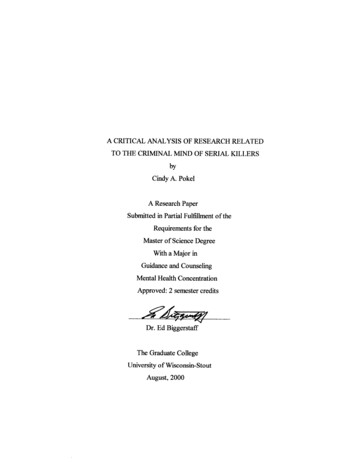
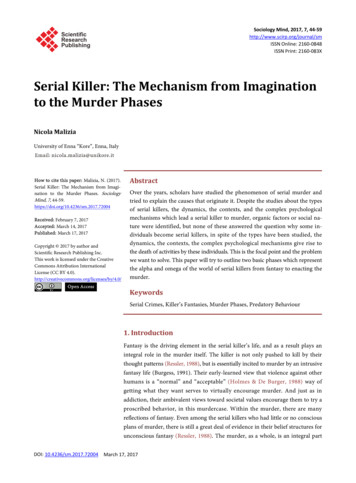
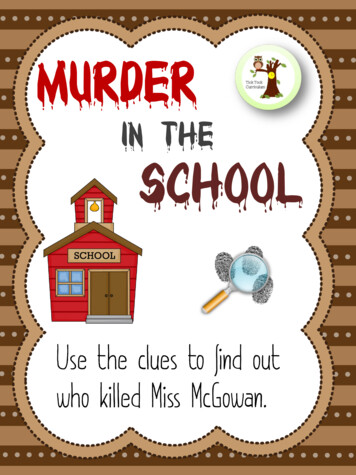
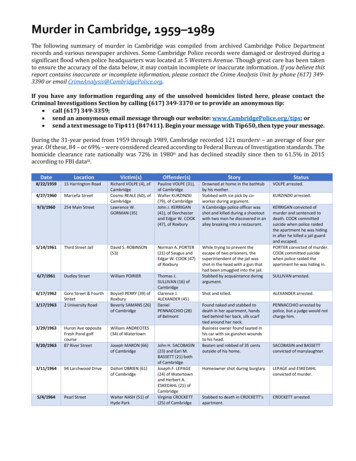



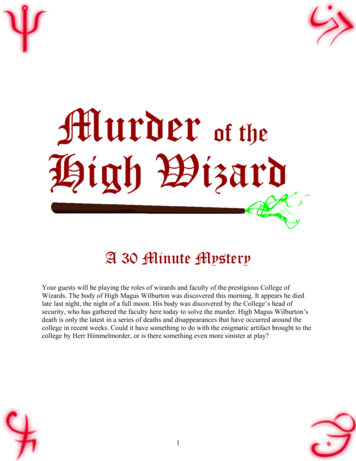
![[SURVEY PREVIEW MODE] DLIS SURVEY - fao](/img/19/dlis-questionnaire.jpg)
